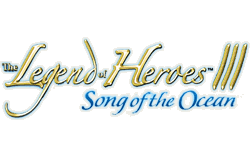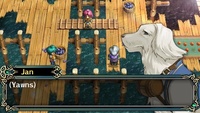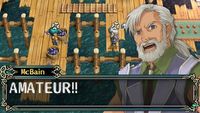|
|

|
PLATFORM
|
PSP
|
BATTLE SYSTEM
|

|
INTERACTION
|

|
ORIGINALITY
|

|
STORY
|

|
MUSIC & SOUND
|

|
VISUALS
|

|
CHALLENGE
|
Easy
|
LENGTH
|
20-40 Hours
|
|
OVERALL

|
+ Save anywhere
+ Ties up the trilogy nicely
+ Interesting cast
- Takes too long to get started
- Dry translation
- Unbalanced combat to story ratio
|
Click here for scoring definitions
|
|
|
The early Legend of Heroes games on PlayStation Portable had problems, as my reviews of A Tear of Vermillion and Prophecy of the Moonlight Witch made clear. The Gagharv trilogy on PSP was markedly changed from Falcom's initial Japanese PC releases, and Namco Bandai's dry, typo-ridden localizations thoroughly butchered their stories. Despite all that, I still felt compelled to finish off the trilogy with The Legend of Heroes III: Song of the Ocean. While the game still suffers from most of the same problems as the prior two, it does finally reward those who've persevered through all three.
Song of the Ocean pulls off the standard turn-based combat formula serviceably, but lacks the deeper tactical experience seen in the more recent Trails in the Sky. Players have a party of up to four at a time with two characters in reserve. Each character has unique attacks and abilities, making party selection fairly flexible, though secondary characters rotate in and out as the story progresses, forcibly altering the party roster. Combat is not overly complex, so shifting characters around at least allows for new strategies. Party members are not so dramatically different that it will require much thought, but it helps add a little variety.
Key to being successful in combat is the timing of when to use finishing moves, powerful abilities that can be used once a character's power meter is at 100. These skills will cut off an enemy's attack, often meaning the difference between life and death, especially against bosses. Boss battles are easily the most interesting combat incidences, as standard enemies often take too long to defeat. In fact, even enemies marked as aggressive, meaning they should still be within the party's level range, are often best avoided. Ditching these overabundant battles helps to reduce the tedium a little.
The biggest problem with Song of the Ocean is its slow pacing. Even the most enjoyable battle system can grow weary if it outstays its welcome, which happens pretty quickly here. There are often long stretches where nothing happens outside of constant combat. Early on the story segments are brief and uninteresting, often with characters talking to someone prior to running around fighting more enemies, then returning to report the results. Thankfully, this is only a problem to start with, as things pick up later on.
 I agree, Jan.
I agree, Jan.
|
|
The game starts off with a focus on the travels of the musical trio of Forte, Una, and Forte's grandfather McBain, plus the loyal dog Jan. The group heads off to help McBain with his renewed dream of gathering the legendary musical Resonance Stones scattered around the world by the famous musician Leone Friedrich Richter. Early on this simply consists of traveling from one town to the next and solving whatever problems the locals have. Usually during the course of helping out the townsfolk, a Resonance Stone is found. This cycle repeats itself with little variation until over halfway through the game when things finally take a turn for the dramatic with a few plot twists.
From here on out, the story gets more interesting as players discover the secret of the Stones, learn of ancient civilizations, and even uncover how Song of the Ocean ties into the other two games in the Gagharv trilogy. For those who have played the other two games in the trilogy, some of these revelations will be quite interesting, especially as the conclusion approaches. Without having played the others, these story points will not be a total loss; they just won't have the same impact on those who haven't played the preceding games. While not groundbreaking by any means, the second half of the game really attempts some interesting plot developments; it's just a shame it takes slogging through so much monotony in the first half to get there.
Throughout the game, players encounter tuning forks that transport the party to a special area where there is an option to import save data from the two prior PSP games. Depending on the level of the party, different battle areas are made available and players can gather party members from the other games to assist with this bonus content. While conceptually interesting, in practice it is much more cumbersome than it needs to be. Since only six characters can be in the party with a mere four actually participating in battle, adding dozens of characters from the other games makes party management a chore. On top of that, players have to travel out of the teleportation area and into an alternate world to hunt down and talk to these party members in order to get them to join. For those looking for additional content to keep the game going, this is a nice addition, but it's just too convoluted for anyone attempting a casual pass.
 McBain talking to the game's translators.
McBain talking to the game's translators.
|
|
Song of the Ocean stays true to its name with a strong focus on music. Apart from the background music, the party will often perform pieces of music as part of the story. Sadly, many of these story pieces are drab or uninteresting, with the best music coming as part of actual story segments or battle themes instead. This makes for an unusual Falcom game, as the music never really shines. There are a few standout tracks, but they are infrequently heard in-game, and the ones heard most throughout get tiresome quickly.
As for other aspects of the game, nothing else really helps Song of the Ocean stand out. The main character sprites are fine, but NPCs and enemies do not sport the same level of quality, nor do the town and dungeon backgrounds. Menus and inventory management continue to be a mess due to having to dig through the clunky interface to do most anything. At least there is a save anywhere feature, which is very helpful for a portable experience. The worst offender is clearly the localization. Much like the other two games that Namco Bandai localized, the script is a typo-filled and awkward mess that is uninteresting even when grammatically correct. While not as bad as that seen in the first two localizations, Song of the Ocean's translation feels rushed and comes across as soulless.
For newcomers to the series, I would not recommend this be your first stop, as this game will put you to sleep faster than a lullaby. There are many interesting moments in the story during the latter half, but most will only really impress those who actually completed the prior two entries and suffered through the slow and boring first half. While a more competent experience than the first two, it still did not receive the love it needed to make the game feel like a complete experience. I enjoyed seeing how all the pieces of the trilogy tied together, but many of the steps taken to get to the end were almost too boring to make it worthwhile. Despite all the problems, there is still a certain charm buried underneath all attempts to ruin this trilogy. I would love to see these games remade with Falcom's direct supervision, not simply ported by a small company and then poorly localized by a publisher that did not care about releasing a quality product. The Gagharv trilogy has a lot of heart, but it's a shame that North America has never been able to enjoy a quality version of Falcom's original vision.
Review Archives
|









